【推荐】2019春七年级英语下册Unit2Neighbours语法专练课时作业新版牛津版.docx
牛津译林版英语七下Unit 2《Neighbours》(Task)教学设计

牛津译林版英语七下Unit 2《Neighbours》(Task)教学设计一. 教材分析牛津译林版英语七下Unit 2《Neighbours》主要介绍了关于邻居的话题。
通过学习本单元,学生能够掌握与邻居相关的词汇和表达方式,学会如何描述邻居的特点和习惯,以及如何用英语进行简单的日常交流。
本单元的主要语言点包括形容词和副词的比较级和最高级形式,以及一般现在时态的运用。
二. 学情分析七年级的学生已经具备了一定的英语基础,能够听懂并运用一些基本的英语句型进行交流。
但是,对于形容词和副词的比较级和最高级形式以及一般现在时态的运用可能还不够熟练。
因此,在教学过程中,需要注重对这些语言点的讲解和操练,以确保学生能够正确运用。
三. 教学目标1.知识目标:–能够听懂、会说、会读本单元的生词和重点句子。
–掌握形容词和副词的比较级和最高级形式。
–学会用英语描述邻居的特点和习惯。
–能够运用一般现在时态进行简单的日常交流。
2.能力目标:–能够运用本单元所学知识进行简单的对话交流。
–能够正确运用形容词和副词的比较级和最高级形式。
3.情感目标:–培养学生对邻居的尊重和关心。
–培养学生的团队协作精神。
四. 教学重难点1.教学重点:–形容词和副词的比较级和最高级形式。
–一般现在时态的运用。
–与邻居相关的词汇和表达方式。
2.教学难点:–形容词和副词的比较级和最高级形式的运用。
–一般现在时态的运用。
五. 教学方法1.任务型教学法:通过设定各种任务,让学生在实际语境中运用所学知识,提高学生的语言运用能力。
2.情境教学法:创设各种生活情境,让学生在真实的语境中学习英语。
3.合作学习法:引导学生进行小组讨论和合作,培养学生的团队协作精神。
六. 教学准备1.教学课件:制作课件,包括本单元的生词、句子、图片等。
2.教学材料:准备与邻居相关的图片、故事等材料。
3.教学设备:投影仪、电脑等。
七. 教学过程1.导入(5分钟)利用课件展示与邻居相关的图片,引导学生进行观察和思考,引出本课的主题。
2019年春七年级英语下册Unit2Neighbours词汇语法素材新版牛津版
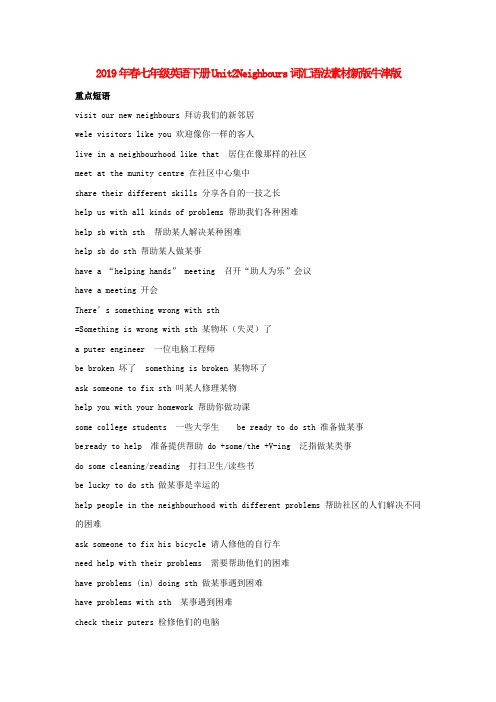
2019年春七年级英语下册Unit2Neighbours词汇语法素材新版牛津版重点短语visit our new neighbours 拜访我们的新邻居wele visitors like you 欢迎像你一样的客人live in a neighbourhood like that 居住在像那样的社区meet at the munity centre 在社区中心集中share their different skills 分享各自的一技之长help us with all kinds of problems 帮助我们各种困难help sb with sth 帮助某人解决某种困难help sb do sth 帮助某人做某事have a “helping hands” meeting 召开“助人为乐”会议have a meeting 开会There’s something wrong with sth=Something is wrong with sth 某物坏(失灵)了a puter engineer 一位电脑工程师be broken 坏了 something is broken 某物坏了ask someone to fix sth 叫某人修理某物help you with your homework 帮助你做功课some college students 一些大学生 be ready to do sth 准备做某事be ready to help 准备提供帮助 do +some/the +V-ing 泛指做某类事do some cleaning/reading 打扫卫生/读些书be lucky to do sth 做某事是幸运的help people in the neighbourhood with different problems 帮助社区的人们解决不同的困难ask someone to fix his bicycle 请人修他的自行车need help with their problems 需要帮助他们的困难have problems (in) doing sth 做某事遇到困难have problems with sth 某事遇到困难check their puters 检修他们的电脑find someone to fix things like broken bicycles 找人修理像坏自行车之类的东西be like a big family 像个大家庭take an umbrella with sb 随身携带一把雨伞wait for us to call back 等我们回电 wait for your call 等你的电话be free 自由的、空闲的 be going to be late 将要迟到了be (so) cloudy 多云 plan a day out 计划外出一天the day after tomorrow 后天 bring some water 带些水make a fire生火cook some food煮食物an office worker 办公室人员 in a police station 在警察所in a post office 在邮局 in the town centre 在镇中心Wendy’s elder brother/sister文迪的哥哥/姐姐be busy with sth 忙于某事be busy doing sth 忙于做某事 work for a pany 效力于一家公司far away from her home 远离她的家 in the future 将来be a puter engineer 做一名电脑工程师sound like a good idea 听起来像是好主意help sick people 帮助病人 be an artist 做一位艺术家in an hour 一小时后 turn on / off 开/关(电器按钮等)go in 进去;进入 go in for 参加,从事next team 下学期 keep busy 保持忙碌cold drink 冷饮料 on the afternoon of 5 March 在3月5日下午look at the information below 看下列信息 feel well 感觉身体好make you feel better 使你感觉更好worry about sth / (not)doing sth 担心某物/担心(不)做某事all our group members 我们所有的团体成员give you some ideas 给你一些建议what to wear to a party 穿什么去参加晚会how to design their home 怎样设计他们的家园重点句型1. What are your neighbours like?= How are you neighbours?你的邻居们(性格品质)如何?What be sb/sth like?你认为…怎么样(性格品质)?(用形容词回答)What do/does sb. like?某人喜欢什么?What do/does sb. look like?某人长什么样子(外貌)?2. Are you not feeling well these days? 你最近觉得不舒服吗?I’m not feeling well.= I don’t feel well. “well”此处是形容词,表示身体好的。
7下Unit 2 Neighbours Grammar 课时作业(包含答案)

7下Unit 2 Neighbours Grammar 课时作业一、根据句子意思及括号中所给中文提示填空。
1. I am planning a day ___________ (外出) with my uncle's family next week.2. Don't play with ____________ (火). It's dangerous!3. It's cold and ___________ (多云的). Let's stay at home.4. He says he ___________ (需要) no help with his homework. It's very easy.5. It's going to rain. Please take an____________ (雨伞) with you.二、根据句子意思,用括号中所给单词的适当形式填空。
1. I hope he ____________ (be) our teacher next year. ,2. It's Friday today. What __________ she ___________ (do) this weekend?3. My parents plan _________ (travel) to Hainan for a holiday this summer.4. --The children__________ (visit) the park tomorrow, aren't they? --Yes, they are.5. Follow me, please, or you ___________ (lose) your way.6. There_____________ (be) a meeting this weekend. Do you know, Tina?三、单项选择。
七年级英语下册 Unit2 Neighbours语法专练课时作业牛津版

Unit 2 Neighbours单元语法专练一般将来时1.概念:一般将来时表示将来发生的动作或存在的状态。
常用的时间状语有tomorrow,the day after tomorrow,soon,in a week,next week/month等。
2.构成:(1)肯定句。
①主语+be(am/is/are)+going to+动词原形+其他。
例如:I’m going to attend a meeting next week.我下个星期要参加一个会议。
②主语+will+动词原形+其他。
例如:I’ll go and visit her next Friday.下周五我要去拜访她。
③主语+shall+动词原形+其他。
例如:This time next week I shall be in Scotland.下周的这个时候我就在苏格兰了。
注意:shall 的主语一般为第一人称。
(2)否定句。
分别在be,will,shall后面加not构成否定句;will not和shall not可缩写为won’t和shan’t。
例如:He isn’t going to marry Jane in May.他不打算在5月份和简结婚。
She won’t do it tomorrow.她明天不会做这件事。
(3)一般疑问句。
分别将be,will,shall放于句首,构成一般疑问句。
例如:Are you going to America by boat or by plane?你到美国是坐船还是坐飞机?Will you do it tomorrow?明天你要做这件事吗?(4)特殊疑问句。
由“特殊疑问词+一般疑问句”构成。
例如:Where are you going to spend your summer holidays?你准备到什么地方去过暑假?What will you do tomorrow?明天你要做什么?3.注意事项:(1)will除了用于一般将来时中,还可表示意愿、邀请、要求等。
七年级英语下册 Unit 2 Neighbours Grammar导学案 (新版)牛津版
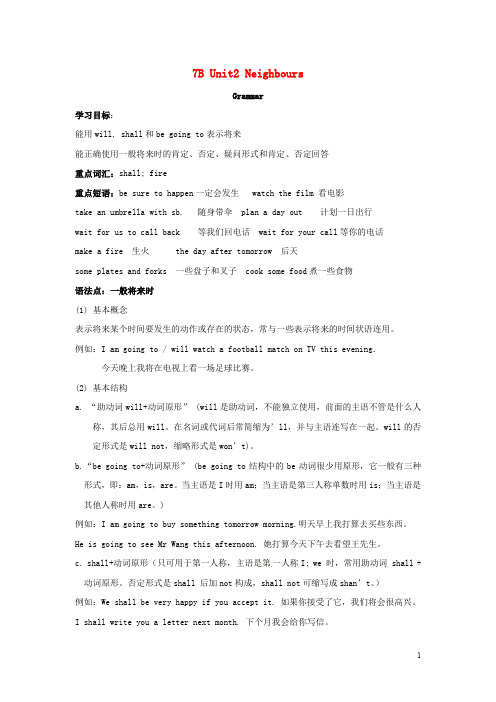
7B Unit2 NeighboursGrammar学习目标:能用will, shall和be going to表示将来能正确使用一般将来时的肯定、否定、疑问形式和肯定、否定回答重点词汇:shall; fire重点短语:be sure to happen一定会发生 watch the film 看电影take an umbrella with sb. 随身带伞 plan a day out 计划一日出行wait for us to call back 等我们回电话 wait for your call等你的电话make a fire 生火 the day after tomorrow 后天some plates and forks 一些盘子和叉子 cook some food煮一些食物语法点:一般将来时(1)基本概念表示将来某个时间要发生的动作或存在的状态,常与一些表示将来的时间状语连用。
例如:I am going to / will watch a football match on TV this evening.今天晚上我将在电视上看一场足球比赛。
(2)基本结构a. “助动词will+动词原形” (will是助动词,不能独立使用,前面的主语不管是什么人称,其后总用will。
在名词或代词后常简缩为’ll,并与主语连写在一起。
will的否定形式是will not,缩略形式是won’t)。
b.“be going to+动词原形” (be going to结构中的be动词很少用原形,它一般有三种形式,即:am,is,are。
当主语是I时用am;当主语是第三人称单数时用is;当主语是其他人称时用are。
)例如:I am going to buy something tomorrow morning.明天早上我打算去买些东西。
He is going to see Mr Wang this afternoon. 她打算今天下午去看望王先生。
牛津译林版英语七下Unit 2《Neighbours》(Grammar)教学设计
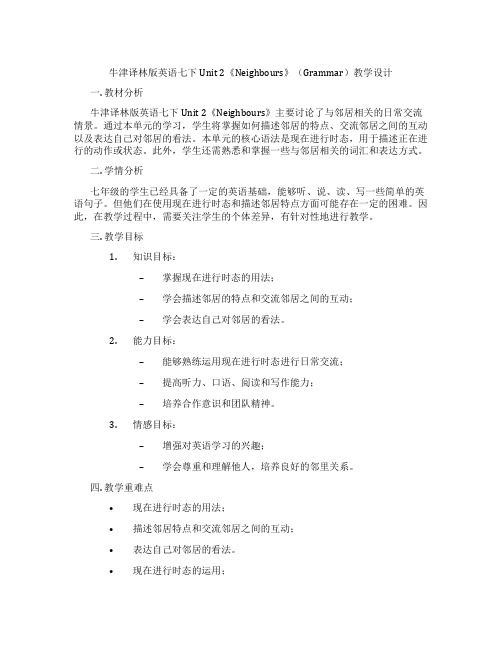
牛津译林版英语七下Unit 2《Neighbours》(Grammar)教学设计一. 教材分析牛津译林版英语七下Unit 2《Neighbours》主要讨论了与邻居相关的日常交流情景。
通过本单元的学习,学生将掌握如何描述邻居的特点、交流邻居之间的互动以及表达自己对邻居的看法。
本单元的核心语法是现在进行时态,用于描述正在进行的动作或状态。
此外,学生还需熟悉和掌握一些与邻居相关的词汇和表达方式。
二. 学情分析七年级的学生已经具备了一定的英语基础,能够听、说、读、写一些简单的英语句子。
但他们在使用现在进行时态和描述邻居特点方面可能存在一定的困难。
因此,在教学过程中,需要关注学生的个体差异,有针对性地进行教学。
三. 教学目标1.知识目标:–掌握现在进行时态的用法;–学会描述邻居的特点和交流邻居之间的互动;–学会表达自己对邻居的看法。
2.能力目标:–能够熟练运用现在进行时态进行日常交流;–提高听力、口语、阅读和写作能力;–培养合作意识和团队精神。
3.情感目标:–增强对英语学习的兴趣;–学会尊重和理解他人,培养良好的邻里关系。
四. 教学重难点•现在进行时态的用法;•描述邻居特点和交流邻居之间的互动;•表达自己对邻居的看法。
•现在进行时态的运用;•准确描述邻居特点和交流邻居之间的互动。
五. 教学方法1.情境教学法:通过设定真实的邻里场景,让学生在实际语境中学习和运用英语;2.交际教学法:鼓励学生进行角色扮演,模拟邻里之间的交流,提高口语表达能力;3.任务型教学法:通过完成小组任务,培养学生合作意识和团队精神;4.反馈与激励:及时给予学生反馈,鼓励学生积极参与课堂活动。
六. 教学准备1.教材:牛津译林版英语七下Unit 2《Neighbours》;2.多媒体课件:图片、视频、音频等教学资源;3.学习任务单:用于引导学生进行小组讨论和任务完成;4.板书用品:黑板、粉笔等。
七. 教学过程1.导入(5分钟)利用图片或视频展示邻居之间的日常生活场景,引导学生谈论自己的邻居。
【牛津版】2019年春七年级英语下册Unit 2 Neighbours词汇与语法精讲精练卷附答案

post n. 邮政 person n. 人 job n. 工作 elder adj. 年纪较长的 future n. 将来 artist n. 艺术家,(尤指)画家 sound v. 听起来 sick adj. 生病的;恶心的 notice n. 布告,通知 information n. 信息 below adv. 下面 better adj. (good/well 的比较级)较好,更好 anything pron. 任何事 design vt 设计,构思 group n. 组,群
2. sick & ill
6
1). sick 既可作表语,也可以作定语。 例句: She is taking care of her sick father. 她在照料生病的父亲。(本句不能用 ill) Excuse me, I feel sick. 对不起,我觉得不舒服 2). ill 意为“有病”时,只用作表语;ill 作定语时,表示“坏的;不良的”。 例句: She was ill in bed with a cold. 她因感冒而卧病在床。 He is an ill man. 他是个坏人。
by bus 乘公交车
by ship 乘轮船
help someone with something 帮助某人解决某种困难
4
四、经典句型 1. Where are you going? 你要到哪儿去? 2. I'm afraid they won't welcome visitors like you. 恐怕他们不会欢迎像你这样的客人。 3. How many buildings are there in your neighbourhood? 你们街区有多少幢建筑? 4. There's something wrong with my computer. 我的电脑出毛病了。 5. You're lucky to live in a neighbourhood like that, Simon. 西蒙,生活在那样的街区你真幸运。 6. That sounds like a good idea. 听起来是个好主意。
牛津译林版七年级下册Unit 2《Neighbours》(Grammar)教学设计
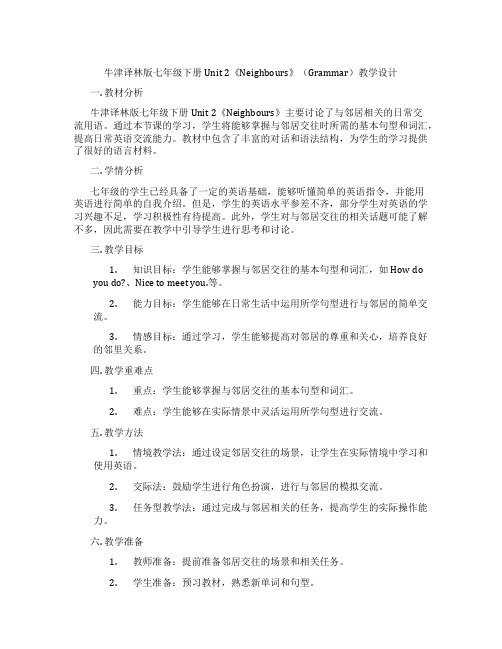
牛津译林版七年级下册Unit 2《Neighbours》(Grammar)教学设计一. 教材分析牛津译林版七年级下册Unit 2《Neighbours》主要讨论了与邻居相关的日常交流用语。
通过本节课的学习,学生将能够掌握与邻居交往时所需的基本句型和词汇,提高日常英语交流能力。
教材中包含了丰富的对话和语法结构,为学生的学习提供了很好的语言材料。
二. 学情分析七年级的学生已经具备了一定的英语基础,能够听懂简单的英语指令,并能用英语进行简单的自我介绍。
但是,学生的英语水平参差不齐,部分学生对英语的学习兴趣不足,学习积极性有待提高。
此外,学生对与邻居交往的相关话题可能了解不多,因此需要在教学中引导学生进行思考和讨论。
三. 教学目标1.知识目标:学生能够掌握与邻居交往的基本句型和词汇,如How doyou do?、Nice to meet you.等。
2.能力目标:学生能够在日常生活中运用所学句型进行与邻居的简单交流。
3.情感目标:通过学习,学生能够提高对邻居的尊重和关心,培养良好的邻里关系。
四. 教学重难点1.重点:学生能够掌握与邻居交往的基本句型和词汇。
2.难点:学生能够在实际情景中灵活运用所学句型进行交流。
五. 教学方法1.情境教学法:通过设定邻居交往的场景,让学生在实际情境中学习和使用英语。
2.交际法:鼓励学生进行角色扮演,进行与邻居的模拟交流。
3.任务型教学法:通过完成与邻居相关的任务,提高学生的实际操作能力。
六. 教学准备1.教师准备:提前准备邻居交往的场景和相关任务。
2.学生准备:预习教材,熟悉新单词和句型。
七. 教学过程1.导入(5分钟)教师通过提问方式引导学生谈论他们认识的邻居,并分享邻居之间的趣事,激发学生的学习兴趣。
2.呈现(10分钟)教师展示邻居交往的场景,引导学生关注其中的角色和情节。
然后,教师呈现教材中的对话,让学生听懂并理解对话内容。
3.操练(15分钟)教师学生进行角色扮演,模拟邻居交往的场景,让学生在实际操作中掌握所学句型和词汇。
Unit 2 Neighbours 课时3 Grammar(教师版)-七年级英语下册同步精品讲义

Unit 2 NeighboursGrammar知识精讲知识点1 一般将来时教材P23-24【用法详解】1. 含义:用来表示在将来发生的动作或存在的状态。
2. 基本结构:(1)am/is/are going to + 动词原形(2)will+ 动词原形(主语部分可以是各种人称)(3)shall+ 动词原形(主语部分为第一人称)3. 用法:①will + 动词原形,表示将来要发生的动作或是存在的状态。
Will you be back in two days?②当句中主语是I或者we时,一般使用shall, 表示征求对方的意见。
When shall we meet tomorrow?③be going to +动词原形,表示计划、打算做某事,表示已决定的并很可能发生的事。
What are you going to do next Sunday?Look at the clouds. There is going to be a storm.4.be going to+动词原形和will+动词原形的比较①若是强调某个意图是经过事先考虑好的,则通常要用be going to;若是表示某个意图没有经过事先考虑,而是在说话的当时才临时想到的,则通常用will。
—Ann is in hospital. 安住院了。
—Oh, really? I didn’t know. I’ll go and visit her. 啊,真的吗?我还不知道。
我要去看看她。
(临时想法,不能用be going to)—Ann is in hospital. 安住院了。
—Yes, I know. I’m going to visit her tomorrow. 我知道,我打算明天去看看她。
(事先考虑的意图,不能用will)②若是有迹象表明要发生某事,通常只用be going to,不用will。
Look at those black clouds. It’s going to rain.③带有时间或条件状语从句的主句通常不宜用be going to,而用will。
2019春七年级英语下册Unit2Neighbours课时内容精讲课时作业(新版)牛津版

309教育网 309教育资源库 Unit 2❶afraid的用法I’m afraid they won’t welcome visitors like you.恐怕他们不会欢迎像你这样的客afraid 作形容词时,意为“害怕的” ,常见用法:1.be afraid that...表示“担心、恐怕”之意,是一种委婉的语气。
例如:We are all afraid that Jack can’t come here on time.我们都很担心杰克不能按时来。
2.be afraid of sth/doing sth意为“怕(做)某事;担心(做)某事”。
例如:The little girl is afraid of going out at night.这个小姑娘害怕在夜间外出。
3.be afraid to do sth意为“害怕做某事”。
例如:Isn’t he afraid to die? 难道他不怕死吗?❷most的用法Most of them have 14 floors.它们大多数有14层。
(P19)1.most作形容词时,意为“大多数的,大部分的”,修饰名词。
例如:Most students are good at Chinese.大多数学生擅长汉语。
2.most作代词时,意为“大多数,大部分”,此时可以和of搭配。
但most of 后面若跟名词,名词前需要定冠词、指示代词或物主代词修饰;most of 后若跟代词,应该跟代词的宾格。
例如:Most of the people singing are women.唱歌的人之中,大部分是女士。
Most of them are teachers.他们中的大多数是教师。
3.most作副词时,意为“很;颇”,相当于very。
例如:I like this magazine most.我最喜欢这本杂志。
❸help的用法They help us with all kinds of problems.他们帮助我们解决各种各样的问题。
2019春七年级英语下册Unit2Neighbours(第3课时)课时作业(新版)牛津版

Unit 2 Neighbours第三课时Reading (2)基础知识回顾Ⅰ.根据句意用所给词的适当形式填空1.Mark is very helpful (help).He often fixes up people’s broken bikes for free.2.There are always a lot of people shopping (shop) in the market.3.I didn’t watch TV last night,because my TV set was broken (break).4.Jim is lucky (luck) to get the nice present.5.I don’t have anything (something) to do at the moment.Ⅱ.根据句意用适当的介词填空1.Mr Wang often helps me with my English writing.2.Would you like to sing a song for the old people?3.At the weekend,we usually play basketball on the school playground.4.There are restaurants,a school and a hospital around our neighbourhood.5.There are many kinds of flowers in the garden.综合能力提升Ⅰ.单项填空(C)1.The people from our community centre help each other.We a big family.A.likeB.likesC.are likeD.are liking(D)2.There are animals in the zoo.A.a kind ofB.many kind ofC.many kindsD.many kinds of(B)3.Can you help me my English?A.inB.withC.fromD.to(A)4.The farmers are getting ready the next year.A.forB.withC.aboutD.to(C)5.—Why do you come here?—Because I have to tell you.A.anything importantB.important anythingC.something importantD.important somethingⅡ.完形填空Carol and Susan are very good friends.They are in the same 1 at school and they often visit 2 home at weekends.Now they are 3 eight yearsold.Carol’s mother has got a new baby.Carol is very 4 to have a little sister.So she is always talking about her to Susan.At first Susan is very 5in the new baby because she doesn’t have any brothers or sisters.But 6 some time she begins to get tired of Carol’s endless talking about it.She alsofeels a little jealous(嫉妒) of her friend.One morning when the two girls 7 in the school ground,Carol says to Susan,“Do you 8 ,Susan,my baby sister has put on nearly half a pound in weight this week?”“That is not very 9 ,” answers Susan.“I know a baby and he puts on ten pounds a day.”“Oh,that can’t be10 ,” answers Carol laughingly.“Whose baby isit?”“An elephant’s,” says Susan.(C)1.A.grade B.tableC.classD.group(A)2.A.each other’s B.theirC.theirsD.each other(C)3.A.all B.twoC.bothD.either(D)4.A.angry B.sorryC.surprisedD.glad(B)5.A.interesting B.interestedC.happyD.busy(C)6.A.before B.forC.afterD.at(B)7.A.play B.meetC.weightD.walk(D)8.A.hear B.thinkC.findD.know(A)9.A.much B.manyC.fewD.little(C)10.A.right B.wrongC.trueD.sure。
春七年级英语下册 Unit 2 Neighbours(第2课时)课时作业 (新版)牛津版-(新版)牛

C.lookD.check
(B)5.—your new job?
—I think it’s usually full of fun.
A.How do you think of
B.What do you think of
4.The Whitesare havingbreakfast now.
5.Wearing a smile on your face not only helps you make friends but also makes youfeelbetter.
Ⅲ.根据汉语意思完成句子,每空一词
1.我们很幸运有这些好座位。
A.Zhang Bingzhu is not free at weekends.
B.Allan Smith is a retired programmer.
C.Bob White es to the munity centre twice a week.
D.You can’t call Allan Smith on Fridays.
3.They know how tofix(修理) their cars.
4.The dictionary is veryhelpful(有用的) for learning English.
5.“Check(检查) your paper carefully before you hand it in,”the teacher says to the students.
Ⅱ.用方框中所给单词的适当形式填空
help,feel,have,be,fix
1.Therewill be/is going to bea“helping hands”meeting tomorrow.
牛津译林版七年级下册Unit 2《Neighbours》(Period 4)课时训练

Unit 2: NeighboursPeriod 4 GrammarName_______Class_______【基础训练】用适当的动词填空1.We hope you__will_come__(come )to my party tomorrow.2.__Will__she__go__(go) to Yancheng next month ?3.Tom__will_be__(be)18 years old next year.4.Where__will__you__visit__(visit) the day after tomorrow ?5.What__are__(be)you going to do after class ?6.—__Is__he__going_to_play__(play) basketball the day after tomorrow ?—Yes, he is.Ⅲ.用will,shall 或be going to填空1.Look at the clouds in the sky.It is going to rain tonight.2.When and where shall we meet?3.The students are going to/will have a picnic next week.4.Will Mr Green take Jack to the park?5.My parents and I are going to/will fly to London next month.【巩固提高】Ⅵ.句型转换1. Mr Wang is going to take his son to school.(改为否定句)Mr Wang isn't __going__ __to__ __take__ his son to school.2. He will bring you some storybooks.(改为一般疑问句)Will __he__ __bring__ you __any__ storybooks?3. The students are swimming in the river now.(用tomorrow改写句子)The students will __swim__ in the river tomorrow.4. Where are you going this Saturday?(改为同义句)Where will you go this Saturday?5. They are going to have a sports meeting next_week.(对画线部分提问)When __are__ they going to have a sports meeting?Ⅶ.根据汉语意思完成句子1.我将邀请我所有的同学参加我的生日聚会。
2019春七年级英语下册Unit2Neighbours(第1课时)课时作业(新版)牛津版
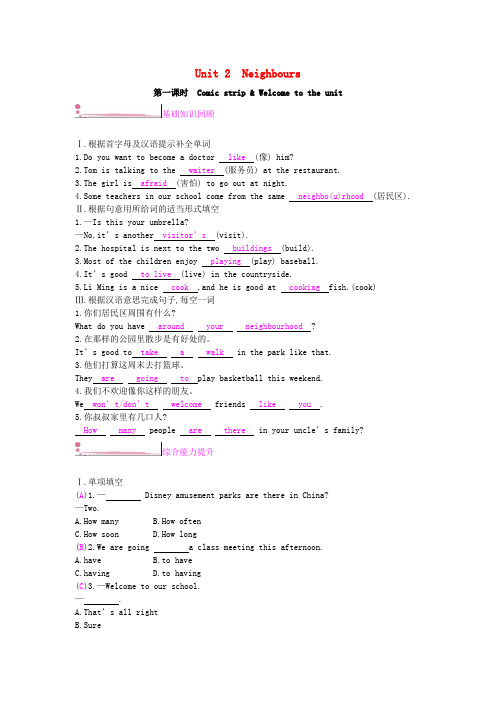
Unit 2 Neighbours第一课时Comic strip & Welcome to the unit基础知识回顾Ⅰ.根据首字母及汉语提示补全单词1.Do you want to become a doctor like (像) him?2.Tom is talking to the waiter (服务员) at the restaurant.3.The girl is afraid (害怕) to go out at night.4.Some teachers in our school come from the same neighbo(u)rhood (居民区). Ⅱ.根据句意用所给词的适当形式填空1.—Is this your umbrella?—No,it’s another visitor’s(visit).2.The hospital is next to the two buildings (build).3.Most of the children enjoy playing (play) baseball.4.It’s good to live (live) in the countryside.5.Li Ming is a nice cook ,and he is good at cooking fish.(cook)Ⅲ.根据汉语意思完成句子,每空一词1.你们居民区周围有什么?What do you have around your neighbourhood ?2.在那样的公园里散步是有好处的。
It’s good to take a walk in the park like that.3.他们打算这周末去打篮球。
They are going to play basketball this weekend.4.我们不欢迎像你这样的朋友。
We won’t/don’t welcome friends like you .5.你叔叔家里有几口人?How many people are there in your uncle’s family?综合能力提升Ⅰ.单项填空(A)1.— Disney amusement parks are there in China?—Two.A.How manyB.How oftenC.How soonD.How long(B)2.We are going a class meeting this afternoon.A.haveB.to haveC.havingD.to having(C)3.—Welcome to our school.—.A.That’s all rightB.SureC.Thank you very muchD.The same to you(D)4.The little girl was afraid on the wooden bridge.A.walkB.walksC.of walkD.of walking(C)5.—Where do you live?—A.What about you?B.Sorry,I don’t know.C.I live in a flat far from school.D.I usually eat at school.Ⅱ.补全对话A:Hey,Lucy!What’s your weekend plan?B:1.GA:Wanda Plaza?2. BB:Because I like Wanda Plaza.A:3. CB:By underground.A:That sounds wonderful.4. DB:On Sunday morning.What about your plan,Betty?A:5. A We’ll have a party next week,so I should prepare(准备) for it.Ⅲ.完形填空One afternoon,Mike,a man of fifty-five years old,went to the doctor’s to talk about his wife.He said to the doctor,“Doctor,I think my wife Anna is deaf(聋的) because she never 1 me the first time and I always have to say the 2 thing many times.”“Well,” the doctor answered,“go home,stand about 15 feet away from her and 3 something to her.If she doesn’t 4 ,move about 5 feet closer and say it again.Keep doing this and you’ll 5 whether she is deaf.”Mike went home and did as the 6 told him.He stood about 15 feet away from his wife in the kitchen as she was washing some tomatoes andsaid,“Anna,what’s for 7 ?”He heard 8 at all.He moved about 5 feet closer and asked again.No answer.He moved 5 feet closer.Still no answer.He moved and stood right 9 her and shouted,“Anna,what’s for dinner?”Anna said loudly,“That’s the 10 time you asked me.It’s chicken soup!”(B)1.A.listens B.hearsC.talksD.looks(A)2.A.same B.sadC.hardD.easy(C)3.A.give B.cookC.sayD.buy(C)4.A.ask B.listenC.answerD.see(D)5.A.make B.takeC.haveD.find(C)6.A.teacher B.wifeC.doctorD.policeman(B)7.A.breakfast B.dinnerC.schoolD.lunch(A)8.A.nothing B.somethingC.anythingD.everything(A)9.A.behind B.untilC.aroundD.across(D)10.A.first B.secondC.thirdD.fourthⅣ.阅读理解Our new neighbours are the Browns.They have two children,a boy and agirl.The boy is Jack and the girl is Alice.Jack is 11,and he is one year older than me.Alice and my sister Nancy are 8 years old.At weekends,Nancy and I like to go to play with Alice and Jack.Both Jack and I really enjoy playing computer games.Sometimes the girls join us,but the games they enjoy are different from the ones we like.There is a big park near our house.Sometimes,when the weather is fine,the four of us will go for bike rides there.We often stop at the huge playground to have some fun.Jack and I like to play basketball,but the girls like to sing and dance.Our families often have dinner together.On some days,they come over to our house and on other days,we go over to theirs.Mr Brown and his wife cook really well.Nancy and I are very glad to have the Browns next door.It’s great to have friends living so near.(B)1.Who are the writer’s new neighbours?A.A family of three.B.The Browns.C.Jack and Nancy.D.Alice and Nancy.(A)2.How old is Alice?A.8.B.9.C.10.D.11.(C)3.The girls like to at the playground in the park.A.listen to musicB.play basketballC.sing and danceD.play computer games(D)4.Where do the two families have dinner together?A.At a park nearby.B.At a restaurant.C.In a forest.D.At their houses.(B)5.The writer thinks it’s to be friends with the new neighbours.A.boringB.greatC.difficultD.safe。
- 1、下载文档前请自行甄别文档内容的完整性,平台不提供额外的编辑、内容补充、找答案等附加服务。
- 2、"仅部分预览"的文档,不可在线预览部分如存在完整性等问题,可反馈申请退款(可完整预览的文档不适用该条件!)。
- 3、如文档侵犯您的权益,请联系客服反馈,我们会尽快为您处理(人工客服工作时间:9:00-18:30)。
Word文档,精心制作,可任意编辑
Unit 2 Neighbours
单元语法专练
一般将来时
1.概念:一般将来时表示将来发生的动作或存在的状态。
常用的时间状语有tomorrow,the day after tomorrow,soon,in a week,next week/month等。
2.构成:
(1)肯定句。
①主语+be(am/is/are)+going to+动词原形+其他。
例如:
I’m going to attend a meeting next week.我下个星期要参加一个会议。
②主语+will+动词原形+其他。
例如:
I’ll go and visit her next Friday.下周五我要去拜访她。
③主语+shall+动词原形+其他。
例如:
This time next week I shall be in Scotland.下周的这个时候我就在苏格兰了。
注意:shall 的主语一般为第一人称。
(2)否定句。
分别在be,will,shall后面加not构成否定句;will not和shall not可缩写为won’t和shan’t。
例如:
He isn’t going to marry Jane in May.他不打算在5月份和简结婚。
She won’t do it tomorrow.她明天不会做这件事。
(3)一般疑问句。
分别将be,will,shall放于句首,构成一般疑问句。
例如:
Are you going to America by boat or by plane?你到美国是坐船还是坐飞机?
Will you do it tomorrow?明天你要做这件事吗?
(4)特殊疑问句。
由“特殊疑问词+一般疑问句”构成。
例如:
Where are you going to spend your summer holidays?你准备到什么地方去过暑假?
What will you do tomorrow?明天你要做什么?
3.注意事项:
(1)will除了用于一般将来时中,还可表示意愿、邀请、要求等。
例如:
I’ll be glad to help you.我很乐意帮助你。
Will you go shopping with me?你愿意和我一起去购物吗?
Will you please not talk?请不要讲话好吗?
(2)shall用于第一人称I或we作主语的一般疑问句中,还可表示征求对方的意见或
提出建议。
例如:
Shall we have a rest?我们休息一下好吗?
(3)be going to常表示根据迹象判断要发生某事。
例如:
Look at those black clouds!It’s going to rain.看那些乌云!要下雨了。
(4)there be结构的一般将来时形式:there will be或there be(is/are) going to be。
例如:
There is going to be a party this weekend.这个周末将有一次聚会。
Ⅰ.单项填空
(B)1.They an English evening class next Sunday.
A.are having
B.are going to have
C.will having
D.is going to have
(A)2.What time we meet at the gate tomorrow?
A.shall
B.would
C.do
D.are
(C)3.There a meeting tomorrow morning.
A.is
B.has
C.will be
D.have
(C)4.He will be back with his uncle .
st week
B.just now
C.the day after tomorrow
D.yesterday
(D)5.—Have you watched the movie Operation Red Sea?
—Not yet.I it with my friends tomorrow.
A.watch
B.watched
C.am watching
D.will watch
Ⅱ.按要求完成句子,每空一词
1.Bill is going to watch TV this afternoon.(改为一般疑问句)
Is Bill going to watch TV this afternoon?
2.Many of their classmates will own their phones soon.(改为否定句) Many of their classmates won’t own their phones soon.
3.We will travel to the Great Wall after the exam.(对画线部分提问) Where will you travel after the exam?
4.My cousin will fly to Shanghai next week.(对画线部分提问)
What will your cousin do next week?
5.There is an art show in the hall this week.(改为一般将来时) There will be an art show in the hall next week.。
